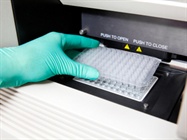
RT-PCR, also known as Reverse Transcriptase PCR, is a variation of the polymerase chain reaction that typically measures RNA expression levels. In RT-PCR, complementary DNA (cDNA) is made by reverse transcribing of the RNA templates with the enzyme reverse transciptase. This technique is used to qualitatively study gene expression, and can be combined with real time PCR (qPCR) to quantify RNA levels. RT-PCR is used in research laboratories to study gene expression, for example in experiments to distinguish exons from introns, and can be used clinically to diagnose genetic diseases and monitor drug therapy. RT-PCR requires an RNA template, enzyme, nucleotides, buffers and thermocyclers to produce RT-PCR products. Kits are available to simplify and streamline the process. The technique can be complex as RNase, the enzyme that degrades RNA is ubiquitous, and the slightest DNA contamination can disrupt results. Fortunately products for RNase detection and decontamination are available. Look for RNase free consumables and reagents that contain RNase inhibitors and RNA stabilizers to ensure accurate and reliable RT-PCR.
New methods will allow realization of CRISPR's full potential
qPCR might be the gold standard, but dPCR use is increasing.
Reverse Transcriptase (RT)-PCR of RNA with extensive secondary structures, or ...
Deoxyribonucleases (DNases) are abundant in nature and can potentially degrade ...
The Sapphire FL Biomolecular Imager is a field-upgradable laser scanner, with a ...
Meet MauriceFlex, your fully integrated capillary electrophoresis platform that ...